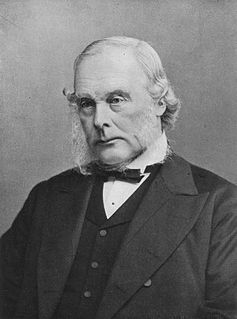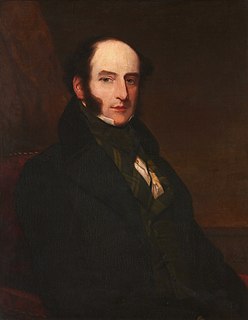
Joseph Lister, 1st Baron Lister, was a British surgeon, medical scientist, experimental pathologist and a pioneer of antiseptic surgery and preventative medicine. Joseph Lister revolutionised the craft of surgery in the same manner that John Hunter revolutionised the science of surgery.

The Royal College of Surgeons of England is an independent professional body and registered charity that promotes and advances standards of surgical care for patients, and regulates surgery and dentistry in England and Wales. The College is located at Lincoln's Inn Fields in London. It publishes multiple medical journals including the Annals of the Royal College of Surgeons of England, the Faculty Dental Journal, and the Bulletin of the Royal College of Surgeons of England.

James Syme was a pioneering Scottish surgeon.

Robert Liston was a Scottish surgeon. Liston was noted for his speed and skill in an era prior to anaesthetics, when speed made a difference in terms of pain and survival. He was the first Professor of Clinical Surgery at University College Hospital in London and performed the first public operation utilizing modern anaesthesia in Europe.

The Royal College of Physicians and Surgeons of Glasgow, is an institute of physicians and surgeons in Glasgow, Scotland.
Prof John Lizars FRSE was a Scottish surgeon, anatomist and medical author.

James Bell Pettigrew FRSE FRS FRCPE LLD was a Scottish anatomist and noted naturalist, aviation pioneer and museum curator. He was a distinguished naturalist in Britain, and Professor of Anatomy at St Andrews University from 1875 until his death.
The Master of Surgery is the most advanced qualification in surgery. Depending upon the degree, it may be abbreviated ChM, MCh, MChir or MS. At a typical medical school the program lasts between two and three years. The possession of a medical degree is a prerequisite. The ChM can be awarded on both clinical and academic competency or on academic competency. The regulations may ask for surgical experience and a thesis topic that is not purely medical.

Rear admiral Sir William Watson Cheyne, 1st Baronet, was a Scottish surgeon and bacteriologist, who pioneered the use of antiseptic surgical methods in the United Kingdom.
James Walker Dawson was a Scottish pathologist remembered for his work on multiple sclerosis including the description of the eponymous Dawson's fingers.

Charles Murchison was a British physician and a noted authority on fevers and diseases of the liver.
Sir James Rögnvald Learmonth (1895–1967) was a Scottish surgeon who made pioneering advances in nerve surgery.

Thomas Annandale, FRCS FRSE (1838–1907) was a Scottish surgeon who conducted the first repair of the meniscus and the first successful removal of an acoustic neuroma, and introduced the pre-peritoneal approach to inguinal hernia repair. He served as Regius Professor of Clinical Surgery at the University of Edinburgh. His collection of anatomical specimens was donated to the Surgeon's Hall in Edinburgh and is now known as the Thomas Annandale Collection.

Sivapatham Vittal is an Indian surgical endocrinologist, considered by many as the Father of Surgical Endocrinology in India. The Government of India honored Vittal in 2011, with the fourth highest civilian award of Padma Shri.

John Chiene, CB, LLD, MD, FRSE, FRCSEd was a Scottish surgeon, who was Professor of Surgery at the University of Edinburgh during some of its most influential years. He was a founder of the Edinburgh Ambulance Service. The Chiene Medal is presented as an annual prize in surgery at the University. He served as President of the Royal College of Surgeons from 1897-99.
Peter David Handyside FRSE FRCSE (1808–1881) was a Scottish surgeon and anatomist. He was president of the Royal Medical Society in 1828. He won the Harveian Society Medal in 1827 and was its secretary in 1837. He was also president of the Medico-Chirurgical Society of Edinburgh in 1871.

Sir John Bruce, was a Scottish surgeon who was Regius Professor of Clinical Surgery in the University of Edinburgh and President of the Royal College of Surgeons of Edinburgh.

Alexander Miles MD, LL.D, FRCSEd was a Scottish surgeon who worked at the Royal Infirmary of Edinburgh. He was known for the quality of his surgical teaching, for his role as a medical journal editor and as the author of popular surgical textbooks and books on surgical history. He was elected President of the Royal College of Surgeons of Edinburgh.
Extramural medical education in Edinburgh began over 200 years before the university medical faculty was founded in 1726 and extramural teaching continued thereafter for a further 200 years. Extramural is academic education which is conducted outwith a university. In the early 16th century it was under the auspices of the Incorporation of Surgeons of Edinburgh (RCSEd) and continued after the Faculty of Medicine was established by the University of Edinburgh in 1726. Throughout the late 18th and 19th centuries the demand for extramural medical teaching increased as Edinburgh's reputation as a centre for medical education grew. Instruction was carried out by individual teachers, by groups of teachers and, by the end of the 19th century, by private medical schools in the city. Together these comprised the Edinburgh Extramural School of Medicine. From 1896 many of the schools were incorporated into the Medical School of the Royal Colleges of Edinburgh under the aegis of the RCSEd and the Royal College of Physicians of Edinburgh (RCPE) and based at Surgeons' Hall. Extramural undergraduate medical education in Edinburgh stopped in 1948 with the closure of the Royal Colleges' Medical School following the Goodenough Report which recommended that all undergraduate medical education in the UK should be carried oy by universities.
Guan Bee Ong OBE, PSM, DSc was a Hong Kong academic surgeon who was professor of surgery at the University of Hong Kong. Born in Raj of Sarawak, he acquired a reputation as a skilled and innovative surgeon in British Hong Kong, who encouraged original research among surgical trainees. Originally a general surgeon whose practice included cardiac and neurosurgery, under his leadership surgical specialities and subspecialties were developed in Hong Kong.












